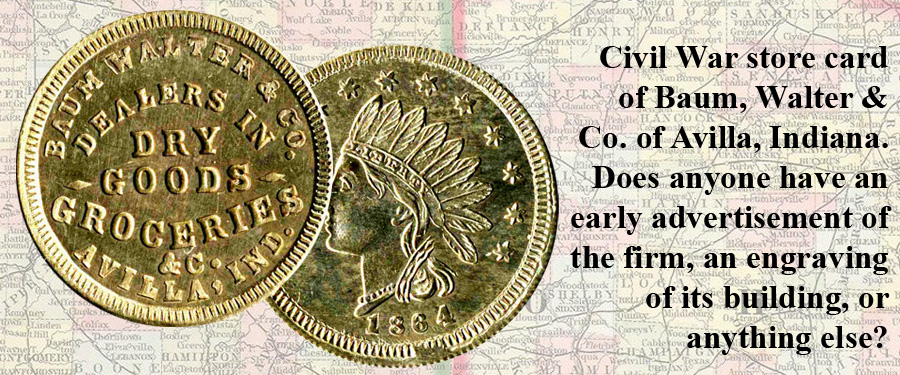
Civil War tokens have been one of my great pleasures in numismatics. I first discovered them in the late 1950s when I visited Dr. George J. Fuld, then a professor at M.I.T., at his home in Wakefield, Massachusetts. I bought from him many duplicates from his collection.
As you probably know, most Civil War tokens are the size of an Indian Head cent and were made in the early 1860s when regular coins disappeared from circulation. It was uncertain as to whether the North would win, or would the South. Citizens hoarded “hard money,” first gold, then silver, then copper-nickel cents. By the second week of July, 1862, there were no coins at all in circulation. This was a unique time in American history (thank goodness!). My “Coins and Collectors” column in the January issue of The Numismatist deals with these tokens and various other types of substitute Civil War money.
As to Civil War tokens, I have personally collected them for many years. While owning tokens has been a pleasure, learning about their history has been my main source of enjoyment. When the Civil War Token Society (check it on the Internet and, if enticed, sign up for an $18 annual membership) was formed in 1967 I was a founder.
In the meantime, and continuing today, I have been immersed in research concerning the nearly 1,000 different merchants and other private entities that issued these tokens. A few years ago I wrote A Guide Book of Civil War Tokens, which has been a best seller for Whitman Publications and is available on their website. Two years ago I wrote the front matter for U.S. Civil War Store Cards, edited by John Ostendorf and published by the CWTS (again check their website). Getting a copy of this book might be dangerous, as it may cause an addiction for CWTS. Be careful!
Of course, over the years I have done a lot of research in other areas—colonial and state coins, obsolete and federal paper money, medals, Hard Times tokens, the history of numismatics in America, the biographies of great collectors, and more. Time was when this involved buying city directories, going to libraries and filling out call slips for books and newspapers, and more. Today, the Internet beckons.
If you are interested in research, thousands of newspapers, hundreds of city directories, and thousands of books are free for the asking—just a few keystrokes are needed. My life would have been different if such technology had existed 50 years ago.
At present, one of my several research projects is The Specialized Catalog of Civil War Store Cards. This book is to be a supplement for the earlier-mentioned U.S. Civil War Store Cards book published by the CWTS and will also be published by them, perhaps in 2019. It will give fascinating (in my opinion) stories of many CWT merchants. Take for example A.W. Gale, who ran a restaurant in Concord, New Hampshire. Some years earlier in 1849 he headed to California with 100 other people to seek his fortune in the Gold Rush. My biography of him tells of his adventure.
As I write these words I am researching the CWT issuers of Indiana. Along the way I am learning a lot about Indiana history. Such cities as South Bend, Evansville, Indianapolis, and Logansport, to give just a short list, are easy to study, as much as been written about them. Other locations were often settlements, not incorporated towns or cities. An example is Avilla, Indiana. I have a connection to Avilla, although I have never been there. My great grandmother, Frances Miller (later Frances Miller Mumaugh), an accomplished artist who exhibited at the World’s Columbian Exposition and many other places, as a young lady lived in Indiana. A newspaper account called her the Belle of Avilla.
The above said, here is a list of small settlements in Indiana for which I am seeking historical information, particularly about CWT-issuing merchants. If you have any old advertisements, news articles, or other information about them, drop me an e-mail note at qdbarchive@metrocast.net and I’ll reply with thanks.
Here goes:
Avilla, Bethel, Brazil, Brooklyn, Butler, Centerville, Como, Dublin, Fortville, Fremont, Fremont, Granville, Greensboro, Hagerstown, Jamestown, Ligonier, Lynn, Mechanicsburg, Middlebury, Middletown, New Paris, North Vernon, Oldenburg, Seymour, Sullivan, and Swan.
In the meantime Happy Holidays and, in advance, Happy New Year. Thank you for being a friend of Stack’s Bowers Galleries.





